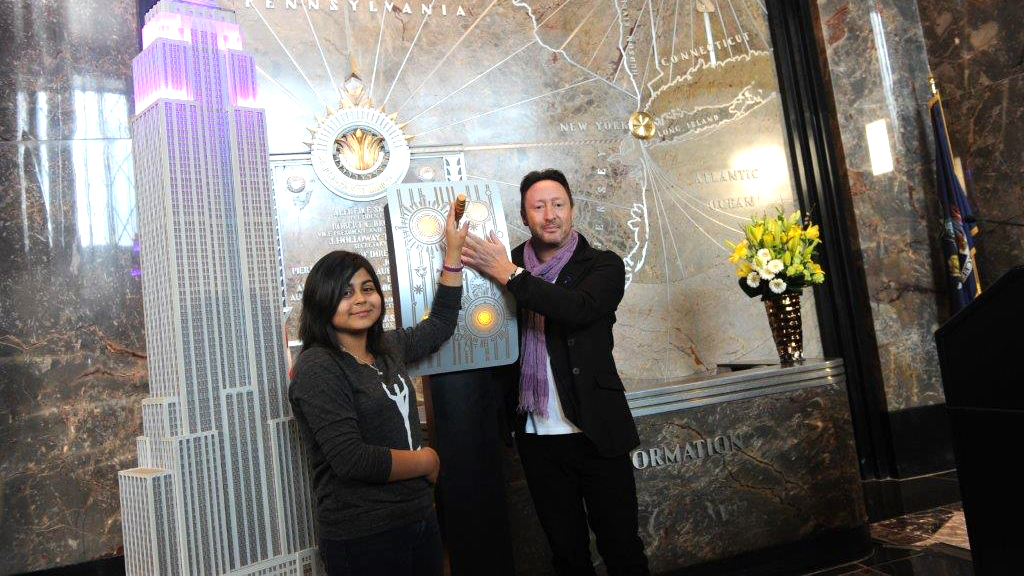Amarissa Mauricio: A Fighting Spirit
In January 2013, U.S. Army Sgt. 1st Class Conrad Nazar was transferred from Wisconsin to a base in Puerto Rico. His young daughter, Amarissa, and her mom, Dyan Zepeda-Nazar, went with him. An aspiring gymnast who loves to read, Amarissa was just finishing her sixth grade year and wondering what middle school would be like, when suddenly, her life changed forever.
“Lupus took away my childhood.”
“In April I began to feel sick,” she remembers. “I was hot and tired. My chest hurt. It was hard to walk.” Her body was under attack: a bacterial infection in her stomach, problems with her liver, terrible joint pain, fluid in her lung, and an enlarged heart. Eight days later, while in the hospital, Amarissa was diagnosed with lupus and advanced kidney disease.
“I remember the doctor taking my mom into the hallway to tell her I had lupus,” Amarissa says. “I was scared. I felt my body letting go. I told my mom, ‘I don’t want to die’ and she said, ‘Then you have to fight.’” She spent the next 42 days doing just that.
Children and teenagers often have more serious and aggressive lupus disease than is seen in adults—especially severe kidney disease, which occurs in 60 percent of those under age 18. In fact, kidney involvement is a major contributor to death in children (and in adults) with lupus.
The treatment must be aggressive, and powerful. Amarissa’s doctors wanted to use chemotherapy. Usually associated with cancer, chemotherapy is often used for children and adults with active lupus kidney disease.
“They told me that chemotherapy would cause me to lose my hair, I could possibly get leukemia, I might not be able to have kids, and I could even die,” Amarissa remembers. “Kids? I hadn’t even thought about having kids. I was a kid! And die?
"Die from the treatment that was supposed to be helping me to live? But after all that, it was when they said that I couldn’t do gymnastics any more that I broke. I felt like I had lost a part of myself.”
In those early days of dealing with lupus, Amarissa faced a grim future: “I learned that a percentage of children whose kidneys are affected by lupus do not make it to adulthood,” she says. “It was like the lottery, but I had won it backwards.”

Now 18 and a senior in high school, Amarissa says she quickly realized that many people don’t know very much about lupus or how debilitating it can be. “I learned that the best way to fight lupus is to bring awareness and raise funds for research and development of new treatments.”
"I hope my voice is powerful enough to convince you to do everything you can so that no one battling lupus, and no child, will suffer any longer."
Over the past five years she has taken part in the Lupus Foundation of America’s Walk to End Lupus Now® events with her family. She serves as one of the Foundation’s Junior Ambassadors for lupus awareness, and has filmed a public service announcement on lupus awareness for the Foundation. She told her story in a YouTube video.
Amarissa also spoke at a Congressional Briefing on Lupus, part of the National Lupus Advocacy Summit on Capitol Hill in March 2018. The focus of the Summit was the urgent medical needs of children and teens with lupus.
It is a harsh reality of lupus that 20 percent of lupus diagnoses are made in children and teens. These young people face a lifetime of physical and emotional damage from treatment-related complications and the harsh side effects from the strong medications now used to keep lupus in check.
That is why one of the Lupus Foundation of America’s most critical goals is the development of tolerable and targeted treatments—especially for children. The LFA is the only national nonprofit health organization with a dedicated program to support research in childhood lupus.
Amarissa’s story is one of ongoing adversity and pain—and determination to triumph over frightening odds.
“I want my voice to be heard. We need funding. We need research. We need a cure. I am just one voice, but I hope my voice is powerful enough to convince you to do everything you can so that no one battling lupus, and no child, will suffer any longer.”
With your help, the Lupus Foundation of America can make Amarissa’s words come true.



